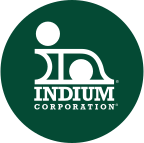Library
Blog
Topic
Type
Year
Author
Product Type
The 6 Alloy Families: Indium – Part 2
Eric Bastow: Indium is a very versatile metal. It readily alloys with other things like bismuth, tin, and lead and that gives us a large spectrum, a wide range of melting points, with all those
The Materials Behind Internet of Things
Phil Zarrow: This video is for electronics assemblers looking to the future of the Internet of Things. It will cover the types of technology and the materials necessary for assembly. Andy, the
How to Properly Use Cp and Cpk in SMT Assembly
Phil Zarrow: This video is for those in the electronics assembly industry that want to establish when to properly use Cp and Cpk. It includes statistical data and examples. Dr. Lasky, an important
Minimizing the Head-in-Pillow Defect in SMT Assembly
Phil Zarrow: This video is for those in the electronics assembly industry that want to minimize the head-in-pillow defect. It includes the solder paste properties that help overcome this challenge.
SMT Reflow Profiling: Using ReflowCoach®
Phil Zarrow: This video is for electronics assembly engineers, technicians, and managers who are looking to match a reflow profile to solder paste specifications. It will tell you how to utilize
Improve SMT Stencil Printing using StencilCoach®
Phil Zarrow: This video is for electronics assembly engineers, technicians, and managers that are seeking to improve stencil printing. It includes details about how stencil printing and pin and paste
SMT Line Balancing using LineCoach® Software
Phil Zarrow: This video is for electronics assemblers that are seeking the correct wave profile, as well as optimal line balancing. This includes real-world examples and useful data.
When to use a Nitrogen Reflow Atmosphere in SMT Wave Soldering
This video is for electronics assemblers who currently are, or are considering, using a nitrogen reflow atmosphere during their process. It includes details regarding when nitrogen should be used.
When to use Nitrogen in SMT Wave Soldering
This video is for electronics assemblers who currently or are considering using nitrogen during their processes. It includes details regarding when nitrogen should be used. Phil Zarrow: Dr. Lasky,
Assessing Field Reliability and Defect Rates in Electronics Assembly
This is video is for electronics assemblers who are required to assess field reliability. It includes determining whether or not sampling can prove that there are zero defects. Phil Zarrow:
SMT Wave Soldering: WaveCoach® Helps Optimize Profiling
This video is for electronics assembly professionals who are looking to improve their wave soldering processes. It includes tools and resources that will help overcome common challenges. Phil Zarrow:
Indium Abundance
Phil Zarrow: This video is for anyone concerned with the availability of indium. I will include an assessment of the status of indium, as well as address wide-spread misconceptions. Bill, let's
No-Clean Fluxes in Semiconductor Assembly
Phil Zarrow: This video is for electronics manufacturers who are interested in cleaning techniques for Internet of Things devices. It will cover water-soluble and no-clean materials and process.
Pros and Cons of Convection Reflow Soldering using Nitrogen
Any electronics manufacturer who has ever considered implementing nitrogen in their soldering process will tell you that the immediate and largest obstacle is cost. One has to either buy nitrogen
High Temperature, Pb-free Die-Attach Material Project Webinars – iNEMI
On April 14th, iNEMI will host two webinars for the purpose of discussing a new project geared toward High Temperature, Pb-free Die Attach Materials. There are two webinars to accommodate different
Causes and Solutions to Voiding in Die-Attach
Phil Zarrow: This video is for engineers challenged by voiding in die-attach applications. It will cover causes and methods to Avoid the Void®. Andy, with regard to voids in die-attachment. What
Voiding in Die-Attach Electronics Assembly
Phil Zarrow: This video is for engineers challenged by voiding in die-attach applications. It will cover causes and methods to Avoid the Void™. Andy, what exactly is voiding as it relates to
SMT Processes Certification
Colleen Bierstine: Hello, I'm Colleen Bierstine, Marketing Communications Specialist at Indium Corporation. Today I'm here with Jim Hall, Phil Zarrow, and Ron Lasky, the creators of the SMT
To Minimize BTC Voiding, Start with the Right Solder Paste
Let’s see what’s up with Patty….. Patty was just dropped off at O’Hare airport after finishing a 3 day workshop on Lean Six Sigma statistics, design of experiments, and
Avoid the Void®
Dr. Andy C. Mackie, MSc: What is a void? A void is a three-dimensional hole in a solder joint that is not soldered. Chris Bastecki: Anyone using QFNs or LGAs or bottom-terminated components really
Reducing Voiding in Bottom-Terminated Components Using Solder Fortification® Preforms
Voiding in bottom-terminated components is a big challenge in the industry today because when you have a significant amount of solder, you also have a significant amount of flux. Flux during reflow
Not sure what you need?
Let us help.
At Indium we research, develop, and manufacture advanced electronics assembly materials solutions to the challenges of today, tomorrow, and the future.


